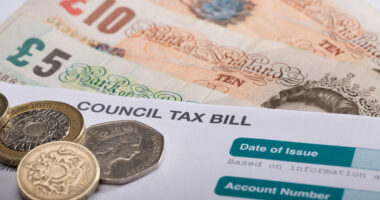HOUSEHOLDS could see their council tax bills go up under new plans announced in the Autumn Budget.
In today’s Jeremy Hunt’s Budget small print, a change which could pave the way for higher council tax bills for households was revealed.
The cap on the level of council tax rises can be increased to 5 per cent, up from the current 2.99%.
Also announced in the Autumn Statement today was:
At present, local councils must hold a referendum if they wish to increase bills by more than the cap of 2.99%.
The rise means that while many of us are trying to cut back as the cost of living grows, some could end up paying more than £2,300 a year in council tax.


The amount shows what councils could bump taxes up by – but ultimately it is up to authorities what they choose to do.
Sarah Coles from Hargreaves Lansdown said: “This is the biggest hike in council tax since 2018.
“By historic standards it’s not a massive rise: in the ten years between 1995 and 2005 council tax rises hit at least 5% a year – and in 2003 they were over 12%.
“However, given how much we’re seeing all our costs rise on all sides, this is the last thing we need.”
Most read in Money
For example, Rutland County Council currently charges just over £2,249 for Band D households.
But with a 5% rise, households could be paying over £166 more a year – paying £2,415 in total.
In Nottingham, which has one of the highest rate of council tax in the country, a Band D home could see a rise of £115 – sending bills from £2,294 to £2,409, if the local authority makes use of its new powers.
Alongside council tax hikes, the Treasury extended a freeze on income tax thresholds until 2028 – dragging millions more into a higher rate of tax.
The freeze was originally supposed to end in 2026.
By expanding it, Brits who earn over £50,000 a year could end up paying £3,659 more in tax overall.
Mr Hunt is also understood to be eyeing a fresh windfall tax grab on the eye-watering profits being made by energy giants.
How to cut your council tax bill
As council tax bills are set to rise, there are ways you may be able to cut back on costs.
One way is to challenge your bill – it could mean you are moved to a lower band and therefore pay less.
You’ll also get a refund of council tax going back to the date you moved into the property.
The first thing to do is find out what council tax band you are in.
You can do this by checking with your local authority or on the postcode checker.
Use the council tax band checker tool to see which band your neighbours are in.
If they are in a lower band than you are, you could successfully make a challenge and get yours lowered.
Next, collect evidence showing you’re paying more – you could collect the addresses of similar properties to yours in a lower band, for example.
Then contact the Valuation Office Agency (VOA) in England and Wales or the Scottish Assessors Association (SAA) to make a challenge.
Follow instructions on the government’s website on how to do this.
If the VOA agrees that your property is in the wrong band, it will contact you to let you know your band will be changed.
It can take up to two months for the VOA to review your case.
Single people
If you live on your own, you’re entitled to 25 per cent off your council tax bill.
This also is the case if there is one adult and one student living together in a household.
You may also qualify if there is one adult and one person classed as severely mentally impaired in the home.
Plus, if you live with someone who doesn’t have to pay council tax, such as a carer or someone who is severely mentally impaired, you could get a 50 per cent reduction.
And, if you live in an all-student household, you could get a 100 per cent discount.
A full list of circumstances that exempt you from paying council tax can be found on Citizens Advice’s website.
Retirees
Pensioners may also find themselves eligible for a council tax reduction.
If you receive the Guarantee Credit element of Pension Credit, you could even be in line for a 100 per cent discount.
If not, you could still get help if you have a low income and less than £16,000 in savings.
And a pensioner who lives alone will be entitled to a 25 per cent discount too.
Low Income households
If you are on a low income or receiving benefits, you could eligible for a reduction on your council tax.
The requirements to get help will vary depending on where you live.
You could also get a deferral if you’re struggling to pay your bill, or you can speak to your council about setting up a payment plan to manage the cost.
But one thing to remember is if you are struggling you should contact your council as early as you can.
Council tax is a priority bill and if you fall behind you could be asked to pay the full year’s balance in one go.


And non-payment could result in bailiffs, court action or even imprisonment.
Check out how this savvy mum saves money on her council tax bills.










